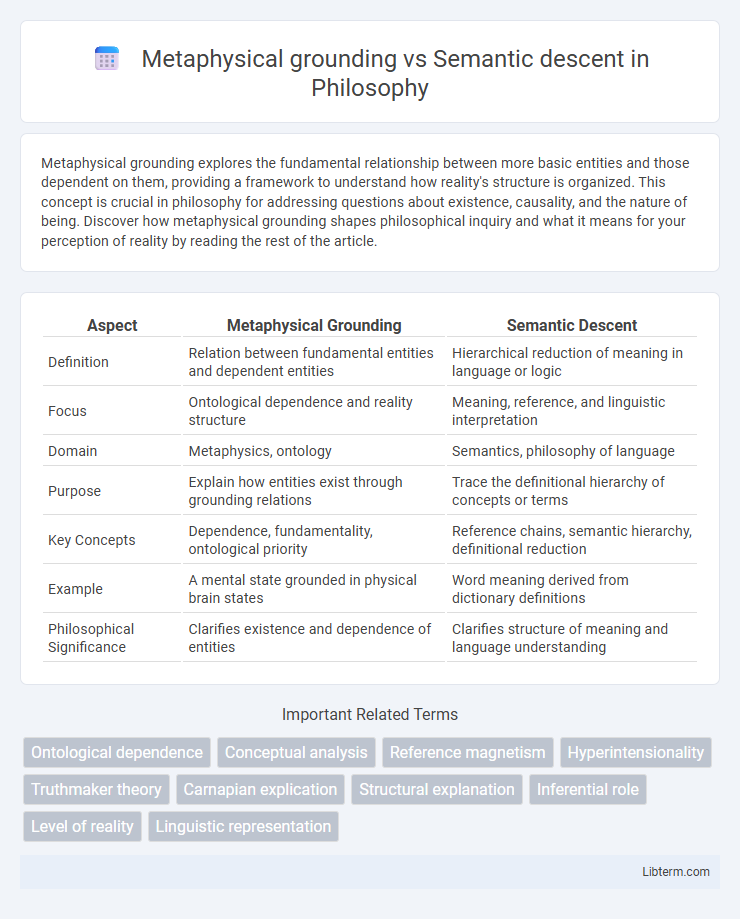Metaphysical grounding explores the fundamental relationship between more basic entities and those dependent on them, providing a framework to understand how reality's structure is organized. This concept is crucial in philosophy for addressing questions about existence, causality, and the nature of being. Discover how metaphysical grounding shapes philosophical inquiry and what it means for your perception of reality by reading the rest of the article.
Table of Comparison
| Aspect | Metaphysical Grounding | Semantic Descent |
|---|---|---|
| Definition | Relation between fundamental entities and dependent entities | Hierarchical reduction of meaning in language or logic |
| Focus | Ontological dependence and reality structure | Meaning, reference, and linguistic interpretation |
| Domain | Metaphysics, ontology | Semantics, philosophy of language |
| Purpose | Explain how entities exist through grounding relations | Trace the definitional hierarchy of concepts or terms |
| Key Concepts | Dependence, fundamentality, ontological priority | Reference chains, semantic hierarchy, definitional reduction |
| Example | A mental state grounded in physical brain states | Word meaning derived from dictionary definitions |
| Philosophical Significance | Clarifies existence and dependence of entities | Clarifies structure of meaning and language understanding |
Introduction to Metaphysical Grounding and Semantic Descent
Metaphysical grounding explains how certain facts or entities depend on more fundamental facts, establishing a hierarchical relationship in the structure of reality. Semantic descent involves analyzing complex concepts by breaking them down into simpler, more fundamental linguistic or semantic components. Understanding both metaphysical grounding and semantic descent is essential for interpreting the foundations of truth and meaning in philosophy.
Defining Metaphysical Grounding
Metaphysical grounding refers to the fundamental relationship where one fact or entity exists in virtue of another, establishing a dependency that explains its existence or nature. It is a metaphysical concept that seeks to clarify the structure of reality by pinpointing the base level upon which higher-level phenomena are grounded. Distinguishing metaphysical grounding from semantic descent emphasizes grounding as an ontological notion, whereas semantic descent primarily addresses definitional or linguistic hierarchies.
Clarifying Semantic Descent
Semantic descent involves the process by which a word's meaning shifts through historical usage, resulting in layers of interpretation that evolve over time. This concept contrasts with metaphysical grounding, which seeks to explain how meanings are fundamentally anchored in reality or the nature of existence. Clarifying semantic descent highlights the importance of tracing linguistic changes to understand how meanings transform, rather than merely identifying their ontological basis.
Historical Context and Philosophical Origins
Metaphysical grounding originated in early 20th-century analytic philosophy, focusing on the fundamental basis of reality and the hierarchical dependence of entities, while semantic descent emerged from linguistic philosophy and logic, addressing meaning relations and the structure of language. The grounding debate traces back to Aristotle's substance theory and was formalized by contemporary metaphysicians such as Kit Fine, who emphasized ontological dependence. Semantic descent draws heavily on Frege's and Wittgenstein's work, analyzing how reference and meaning propagate through language and conceptual schemes.
Key Differences: Grounding vs Descent
Metaphysical grounding refers to the fundamental relation that explains how higher-level phenomena depend on more basic entities or facts, establishing a hierarchical structure of reality. Semantic descent involves tracing the meaning of terms or concepts back through layers of linguistic or conceptual definitions to their original or most basic sense. The key difference lies in grounding addressing ontological dependence in the structure of reality, whereas semantic descent concerns the interpretative lineage and clarification of meaning within language or concepts.
The Role of Ontology in Both Concepts
Metaphysical grounding concerns the foundational structure of reality, explaining how entities or facts depend on more basic entities within an ontological hierarchy. Semantic descent involves the meaning relations between expressions, where some terms derive their reference or content from more fundamental concepts, reflecting an ontological ordering in language. Ontology plays a critical role in both by providing the framework that maps hierarchical dependencies in reality for grounding and hierarchical semantic relations for descent.
Semantic Descent in Logical Analysis
Semantic descent in logical analysis involves breaking down complex expressions into more basic semantic components to clarify meaning and truth conditions. This method prioritizes syntactic structure and truth-functional relationships over metaphysical grounding, emphasizing how meaning propagates through logical connectives and quantifiers. By systematically reducing semantic content to simpler constituents, semantic descent facilitates rigorous formal reasoning within logical systems.
Metaphysical Grounding in Contemporary Metaphysics
Metaphysical grounding in contemporary metaphysics serves as a fundamental relation that explains how certain facts or entities depend on or are determined by more basic ones, structuring reality in a hierarchical manner. It contrasts with semantic descent, which focuses on reducing conceptual or linguistic complexity, whereas grounding addresses ontological dependence and explanations of existence. Recent debates emphasize grounding's role in providing a robust framework for understanding metaphysical explanation, fundamentality, and the layered constitution of reality.
Implications for Philosophy of Language
Metaphysical grounding in philosophy of language addresses the fundamental ontological relationships that determine linguistic meaning, emphasizing how language connects to reality through essential dependencies. Semantic descent, by contrast, explores how meanings evolve or shift downward in linguistic hierarchies, impacting interpretations and usage within discourse. This distinction influences theories of reference, truth conditions, and meaning composition, shaping debates on how language relates to metaphysical structures and cognitive models.
Debates and Future Directions
Debates in metaphysical grounding versus semantic descent center on the ontological status of dependence relations and their explanatory roles in philosophy, with grounding viewed as a metaphysical notion of fundamentality and semantic descent emphasizing linguistic or conceptual hierarchies. Critics argue whether grounding can fully capture explanatory priority without recourse to semantic frameworks, while proponents of semantic descent question the metaphysical assumptions underlying grounding claims. Future directions involve integrating formal tools from logic and metaphysics to clarify these relations, exploring their implications in philosophy of language, and expanding empirical research on cognitive aspects of conceptual grounding and semantic hierarchies.
Metaphysical grounding Infographic

 libterm.com
libterm.com